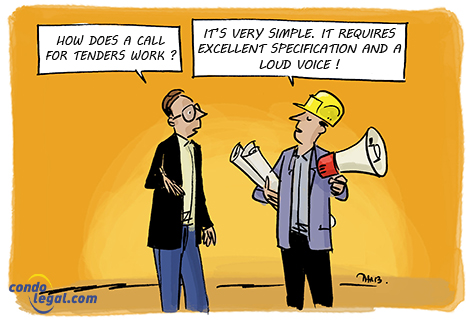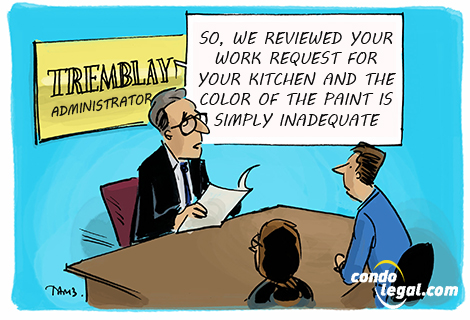Date published: 01/10/2024
Can you refuse the contractor proposed by the syndicate’s insurer?

Recently, I was confronted with a situation that raises important questions regarding insurance in divided co-ownership. After a loss caused by torrential rains, a co-owner refused to allow the contractor designated by the insurer to intervene in their private portion, preferring to hire their own contractor. This case led me to reflect on several issues: Can the co-owner refuse the contractor proposed by the insurer or the syndicate of co-owners? What are the possible alternatives to ensure that the work is carried out properly and on time? What are the rights and obligations of the syndicate of co-owners in such a situation?
These questions directly touch on the legal obligations and practices to be respected when carrying out repair work in co-ownership, and deserve to be explored in depth to fully understand everyone's rights and responsibilities.
Scenario
When a loss occurs, the syndicate of co-owners plays a key role in managing repairs and relations with the insurer. If a co-owner wishes to hire their own construction contractor, it’s important to remember certain legal and practical obligations that apply in this context. In such cases, two scenarios must be distinguished: 1) the loss affects only the co-owner’s private portion, or 2) it affects both common and private portions.
The loss affects only the co-owner’s private portion
If the loss affects only the private portion of a co-owner, the latter may choose to hire their own contractor to carry out the repairs. However, the co-owner must ensure that the contractor complies with the insurer’s conditions, particularly regarding rates, deadlines, and compliance. The chosen contractor must, in particular, hold a license issued by the Régie du bâtiment du Québec. The co-owner must provide the syndicate of co-owners and their insurer with the required documents (invoices, certificates of compliance) proving that the work was carried out according to standards. Additionally, they must comply with the rules, limitations, or prohibitions outlined in the By-laws of the immovable. It’s important to note that such work often requires prior approval from the board of directors.
At the same time, although the syndicate of co-owners is not directly involved in these repairs, it must ensure that the work does not affect the integrity of the common portions, especially if structural elements like walls or collective systems are concerned.
It’s important to remember that until the insurer has received proof that the work has been correctly executed, it will only compensate the syndicate of co-owners for the depreciated value. It is only after the work has been fully completed that the insurer will pay the difference between the depreciated value and the reconstruction cost, allowing the syndicate of co-owners to pass the amount on to the affected co-owner.
The loss affects both common and private portions
When the loss affects both common and private portions, the situation becomes more complex and directly involves the responsibility of the syndicate of co-owners. Under article 1039 of the Civil Code of Quebec, the syndicate of co-owners is responsible for preservation of the immovable, which includes the maintenance and repair of the common portions, such as the foundations and main walls. This responsibility was reinforced by Bill 16, which requires the syndicate of co-owners to ensure that the necessary work to preserve the building is carried out.
In this context, the syndicate of co-owners is obligated to ensure that the repairs comply with all applicable standards and practices to guarantee the complete and proper rehabilitation of the building after a loss. When it comes to the common portions, the co-owner cannot refuse the intervention of the contractor designated by the insurer or the syndicate of co-owners, as the latter is legally responsible for these repairs. It is therefore essential for the syndicate to oversee this work to ensure its compliance.
It is also strongly recommended to hire a single contractor for all the work, whether it concerns common or private portions. This simplifies coordination, avoids delays, and ensures consistent quality in the execution of the repairs. If the co-owner wishes to use their own contractor for repairs to their private portions, this can complicate the management of the work, particularly when the interventions also affect the building's common portions. These complications can lead to delays, affect the quality of the repairs, and cause compliance issues with the insurer’s requirements.
Co-owner’s opposition to the designated contractor’s intervention
When common portions are affected by a loss, the co-owner cannot refuse the intervention of the contractor designated by the syndicate of co-owners without a legitimate reason. If the co-owner persists in their refusal, the syndicate not only has the right but also the obligation to intervene to ensure the work is completed, even without the co-owner’s consent, to guarantee the building’s rehabilitation. Article 1066 of the Civil Code of Quebec stipulates that no co-owner may interfere with the carrying out, even inside his private portion, of work required for the preservation of the immovable decided upon by the syndicate or of urgent work. If the repairs concern common portions, such as part of the structure, the co-owner’s refusal is even more unjustified.
This obligation applies not only to co-owners but also to occupants and tenants. It is still necessary to verify whether the work to be done in the co-owner's private portion is indeed "necessary for the preservation of the immovable" or constitutes "urgent work," allowing reliance on article 1066 of the Civil Code of Quebec. It’s also possible that some work concerns “improvements made to a private portion” under article 1073 of the Civil Code of Quebec, for which the syndicate of co-owners is not obligated to intervene. A more in-depth review would therefore be necessary to clarify these points.
 WHAT YOU SHOULD KNOW ! When a loss affects only the private portion of a co-owner, the latter can choose their own contractor. However, they must provide proof of the work’s proper completion to the insurer and the syndicate of co-owners to receive full compensation.
WHAT YOU SHOULD KNOW ! When a loss affects only the private portion of a co-owner, the latter can choose their own contractor. However, they must provide proof of the work’s proper completion to the insurer and the syndicate of co-owners to receive full compensation.
 WHAT TO KEEP IN MIND: If the loss affects both common and private portions, the syndicate of co-owners is responsible for the repairs. The co-owner cannot refuse the designated contractor for the common portions without a valid reason.
WHAT TO KEEP IN MIND: If the loss affects both common and private portions, the syndicate of co-owners is responsible for the repairs. The co-owner cannot refuse the designated contractor for the common portions without a valid reason.
 WARNING! When common portions are affected by a loss, the syndicate of co-owners must take a proactive role by ensuring that the work is carried out consistently, professionally, and quickly. Thus, a co-owner cannot oppose the intervention of the contractor designated by the syndicate of co-owners for work necessary for the preservation of the building, even if the repairs are being carried out in their private portion.
WARNING! When common portions are affected by a loss, the syndicate of co-owners must take a proactive role by ensuring that the work is carried out consistently, professionally, and quickly. Thus, a co-owner cannot oppose the intervention of the contractor designated by the syndicate of co-owners for work necessary for the preservation of the building, even if the repairs are being carried out in their private portion.
Yves Joli-Coeur, Ad. E.
Lawyer
Dunton Rainville
3055 Boulevard Saint-Martin O
Bureau 610
Laval, QC H7T 0J3
Tél. : (450) 686-8683
Courriel : [email protected]
Chronic express the personal opinions of the author and in no way engage the responsibility of the site editor , CondoLegal.com Inc. The content and opinions expressed in a column are those of the author.
Back to chronicles




